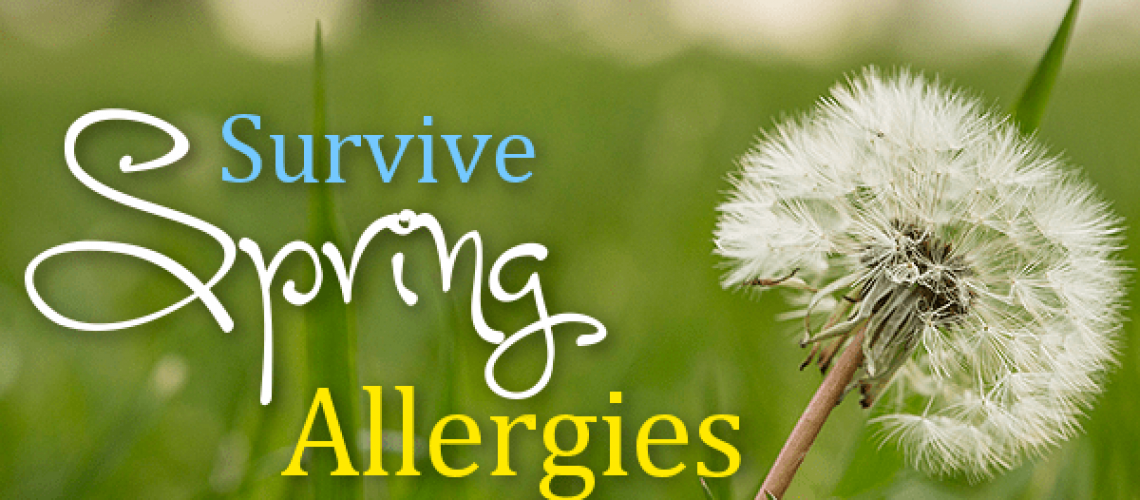April showers bring May flowers…and seasonal allergy symptoms! Boy, can they make us feel miserable; here are some common seasonal allergy symptoms:
• Itchy, watery eyes
• Sneezing 
• Congestion
• Runny nose
• Post-nasal drip
• Tickle/irritation in the ears
• Middle-ear infections
• Scratchy throat
• Asthma
• Hives
• Eczema
• Irritability/mood swings
• Sleep disorders/fatigue – exhaustion
• Decreased concentration/focus
• Decreased decision-making
These symptoms result when our immune system responds to the pollen by releasing histamine and overreacts by producing antibodies to attack the allergen.
If you have certain underlying symptoms, your immune system is more likely to respond in this way. Underlying symptoms can include:
• *Stress
• *Asthma
• Deviated septum
• Polyps
• *Recent trauma/illness/surgery
• Pregnancy
• *and…even Food allergies!
(*Weaken the immune system)
Decongestants, antihistamines, corticosteroids, and over-the-counter allergy medications counteract the histamine produced, but they have a lot of side effects. I am unable to tolerate any decongestants or allergy medications. I sometimes won’t sleep for days if I take one, and once became so dizzy and nauseas from 1/4 dose of Tylenol allergy that my husband had to be called to pick me up in the middle of my massage! Besides sensitive people like me, those who are pregnant or nursing, have high blood pressure, heart disease, kidney or liver disease, glaucoma or thyroid problems should avoid these types of medication.
There are natural remedies for these seasonal allergies of ours. We aren’t all sensitive to each flower, tree or weed that releases pollen, but a majority of people are allergic to ragweed. About 1/3 of those allergic to ragweed are also allergic to foods like cucumbers, zucchini, sunflower seeds, melon, bananas, and chamomile tea.

Foods to avoid if you suffer from seasonal allergies:
• Conventional dairy
• Wheat
• Soy
• Peanuts
• Shellfish
• Sugar
• Chocolate
• Melons
• Bananas (ragweed)
• Cucumbers (ragweed)
• Sunflower seeds (ragweed)
• Bottled citrus juice
• Chamomile (ragweed)
• Echinacea (ragweed)
• Artificial sweeteners
• Processed foods
• Alcohol
• Caffeine
Some of the foods listed above are some of the most common food allergens. Others are highly inflammatory causing bodily stress that will compromise the immune system. However, it’s not all bad news…we can enjoy lots of tasty foods like:
Raw Local Honey because it contains local pollen and in small doses, like 2 tablespoons a day, can relieve symptoms.
Probiotic-rich foods like kombucha, kimchee, kefir, sauerkraut, natto, yogurt and raw cheese aid in digestion, increase energy levels and support our immune system which is housed primarily in the gut.
Pineapples contain an enzyme called Bromelain which is a great anti-inflammatory. They are also loaded with vitamin C, B vitamins that can help reduce our seasonal allergy reactions. All of the nutrients are found in highest concentration in the core.
Fresh organic produce like apples, onions, tomatoes, peppers, broccoli, cauliflower, spinach, kale, asparagus, citrus fruit contain a flavonoid call quercetin. Quercetin is a powerful antioxidant that can help to reduce inflammation. Fresh organic produce is also loaded with lots of vitamins and minerals to support your immune system.
 Apple cider vinegar helps break up mucus and supports lymphatic drainage. Mix a drink with 1 TB ACV, 1 TB fresh-squeezed lemon juice and ½ TB of raw local honey daily.
Apple cider vinegar helps break up mucus and supports lymphatic drainage. Mix a drink with 1 TB ACV, 1 TB fresh-squeezed lemon juice and ½ TB of raw local honey daily.
Hot & Spicy foods will help relieve congestion because they thin the mucous; foods like onion, garlic, cayenne pepper, ginger, horseradish and even cinnamon can help.
Bone broth made from beef, lamb or poultry can help ease respiratory symptoms helping you to expel excess nasal mucus and reduces inflammation while boosting immune function.
Clean protein like grass-fed beef, pastured poultry and wild caught salmon provide needed omega-3 fatty acids, various vitamins and minerals and are not taxing on our immune system like meats containing added hormones, antibiotics coming from animals fed poor quality or GMO based food.
Filtered Water is necessary to keep the body functioning properly; we are 70% water. Staying hydrated allows us to properly detoxify and keeps our mucus from clogging up our respiratory system.
In addition to watching our diets, there are lifestyle changes we can make.
Irrigate sinuses with a neti pot. You can find pH balanced saline rinses and my favorite product to use is Alkalol; it is an all-natural product containing natural antiseptic ingredients like menthol, camphor, wintergreen, spearmint, pine and cinnamon; you can find it in the pharmacy of major grocery or health stores.
Shower before bed to remove residual pollen from your skin and hair.
Regularly launder clothing and bedding to reduce exposure to allergens.
Keep windows closed and stay indoors on high pollen days.
Wipe down pets when they come indoors to eliminate additional pollen from joining them.
Give these tips a try this year to see how your symptoms improve over last year! Remember that food sensitivities can contribute to your seasonal allergies. Keep in mind that I am offering a Food Sensitivity Consult special this month. Chat with me about your symptoms and learn about testing options and how to proceed once you receive your results. $30 for 45 minute appointment.
Jen Granlund CNTP

